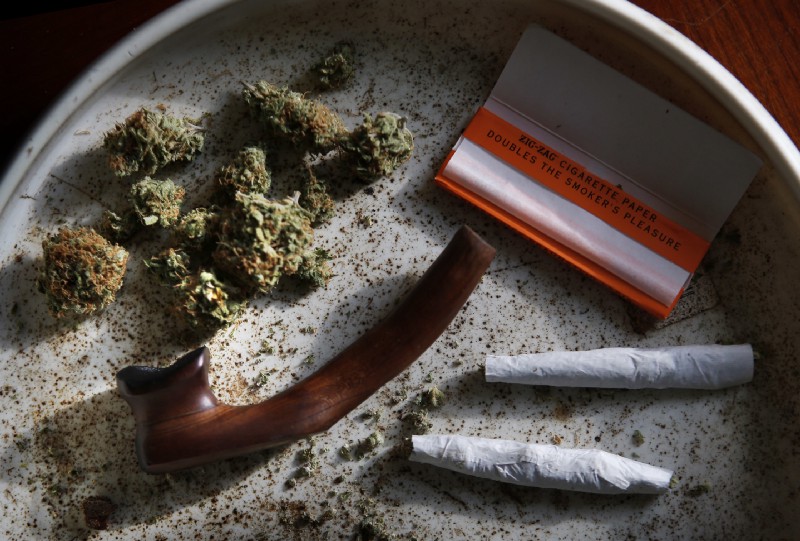It took two years, but Massachusetts marijuana dispensaries finally opened for business on Tuesday.
Well, two of them anyway. The state’s languid, twisting journey from voter approval in 2016 to a ceremonial first over-the-counter sale in Northampton on Tuesday morning has been an object lesson in foot-dragging from skeptics and maladroit problem-solving from regulators.
The first legally-sold package of pot went to the ironically named David Narkewicz, Northampton’s mayor of six years. Narkewicz said he plans to display the cannabis in his office rather than smoke it. The two shops in Northampton and Leicester are the first legal recreational U.S. dispensaries east of the Mississippi River.
Voters overwhelmingly approved the creation of a regulated marketplace for recreational pot in the Bay State in 2016. But the ballot initiative’s mandate that legislators hammer out the final details of the new legal regime for growing, sharing, and selling marijuana there spawned lengthy delays.
While tussles over the details of a legalization regime are to be expected, some lawmakers were eager to derail the voter-backed change entirely, and the process snagged repeatedly as a result.
Critics invited discredited pot legalization skeptics to give old-timey reefer madness presentations to the legislature. The regulatory body lawmakers eventually created as a vehicle to which they punt unresolved disputes stalled matters further. The doubters never got fully on board with their constituents, with Gov. Charlie Baker (D) bemoaning his duties at the signing event for compromise legislation more than a year ago.
“I worry terribly about what the consequences over time will be,” Baker said at the July 2017 signing.
One consequence over time will be an injection of hundreds of millions of new tax dollars from the industry — though the combined force of the regulatory body’s stodginess and local communities’ interactions with potential retail license holders will throttle the green boom for some time to come.
Cannabis taxes are projected to total $62 million for the fiscal year just begun, and leap north of $150 million for the 2020 fiscal year. The state will probably miss those early figures — other legalization states have seen similar initial hiccups on revenue, before their markets kicked on and process wrinkles got smoothed — but it could be just as likely to overshoot them as underachieve. The state’s projections from this summer were based on the belief that only about 10 percent of Massachusetts adults use pot, but the state business journal reported at the time that one survey indicated use rates might be more like 20 percent.
For now, though, Massachusetts seems more likely to replicate Washington’s experience. Few dispensaries and huge initial demand is a recipe for empty shelves and insufficient supply.
A boom delayed is not a boom denied, however. Other legalization states have seen their sales come a good two and three years after initial store openings, as regulators and law enforcement grow in confidence that they’re adequately tracking the product and preventing it from slipping into underage hands or across state lines.
Whenever the Massachusetts market begins to sniff toward its multi-billion-dollar annual sales potential, however, the spoils of that green rush will fall into a small number of very wealthy hands. Although the rosiest projections forecast some 20,000 new jobs connected to the industry in Massachusetts, the structure of the legal cannabis industry has already realigned on terms set by the investor class’s capital rather than the blue-collar utopianism that long attended legalization campaigns across the country.
Financiers have thoroughly and rapidly captured the nascent pot industry nationwide. Strict licensing regimes have made it extremely expensive to even seek a license, let alone launch a grow, extraction, or retail business in a legalization state. Would-be license-holders almost inevitably seek out start-up capital from well-heeled investor groups, trading huge shares of their long-term profitability for the opportunity to get in the game early. Massachusetts is home to one of the clearest demonstrations of the finance community’s extractive business model toward cannabis, the hundred-acre grow campus being built on former Sam Adams brewery land in the middle of the state. The venture capitalists behind that project model their business on the shopping mall industry, leasing cultivation, lab testing, and extraction facility space to state license holders without ever touching the product themselves.
Legalization advocates have traditionally emphasized an individualist utopian micro-agrarianism in their pitch for ending pot prohibition. The massive pent-up demand for the drug and its various extracts could theoretically create an equal-opportunity marketplace full of mom-and-pop outfits that could launch families onto upwardly mobile generational wealth-building trajectories of the sort capitalism has always used to justify itself to the poor. Capitalist potential has always been presented alongside the more pragmatic and emotionally potent arguments about legalization’s potential to reduce mass incarceration and racist criminal justice outcomes.
But this fantastical world of home grows, bootstrapping entrepreneurs, and drug war victims recast as upwardly mobile small businessmen has already mostly evaporated. Capital rules the crop. People victimized by prejudicial tough-on-crime pot laws in the past are mostly prohibited from working in the industry, even just to push a broom for an hourly wage in a shop that’s netting tens of millions of dollars in profit for its distant investor-owners. The brave new world of share-alike kush commerce and smallholdings farm-family rejuvenation is stillborn, rudely replaced by what leading pot-capitalism tout Jay Czarkowski describes as just like “any other industry.”

